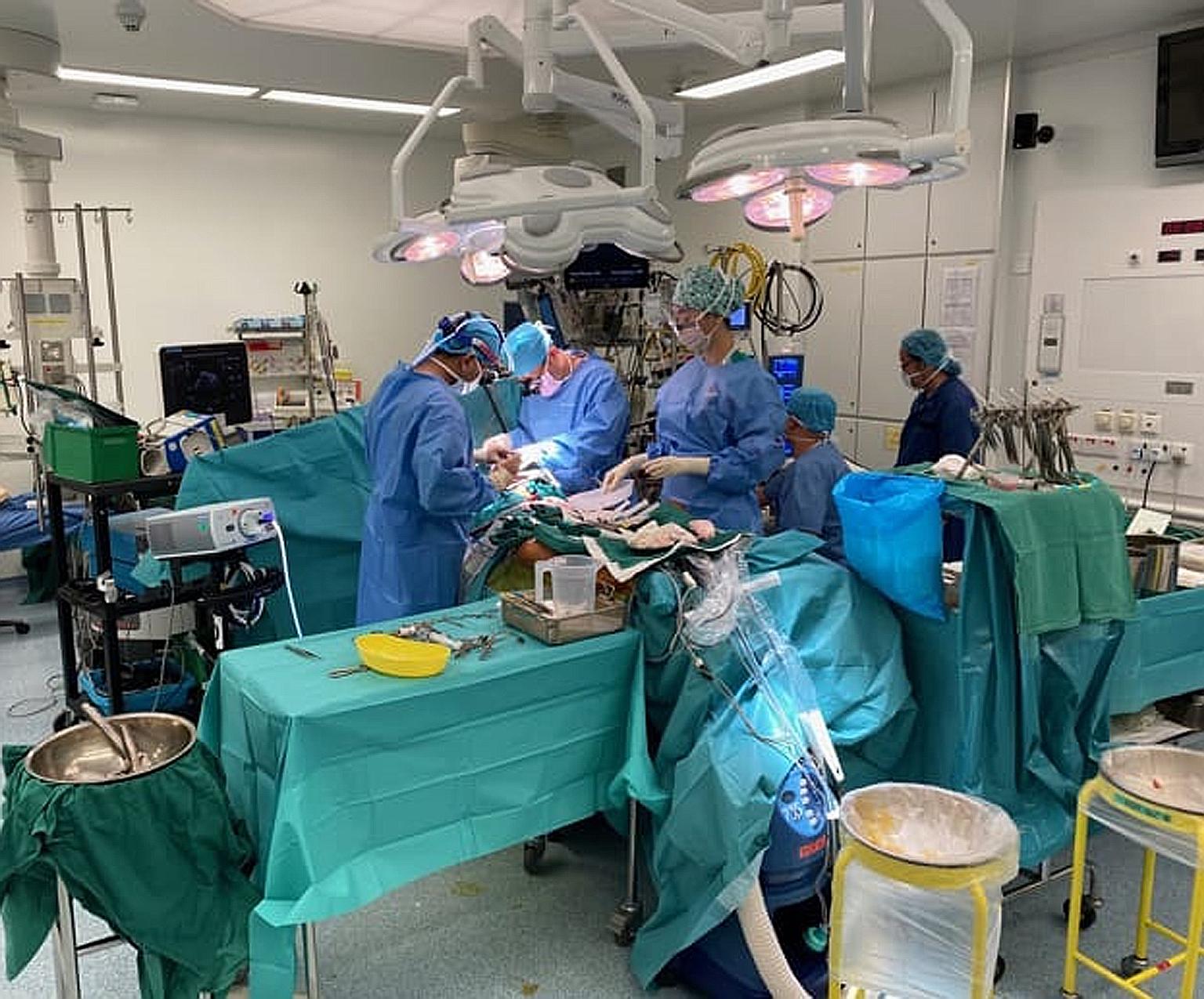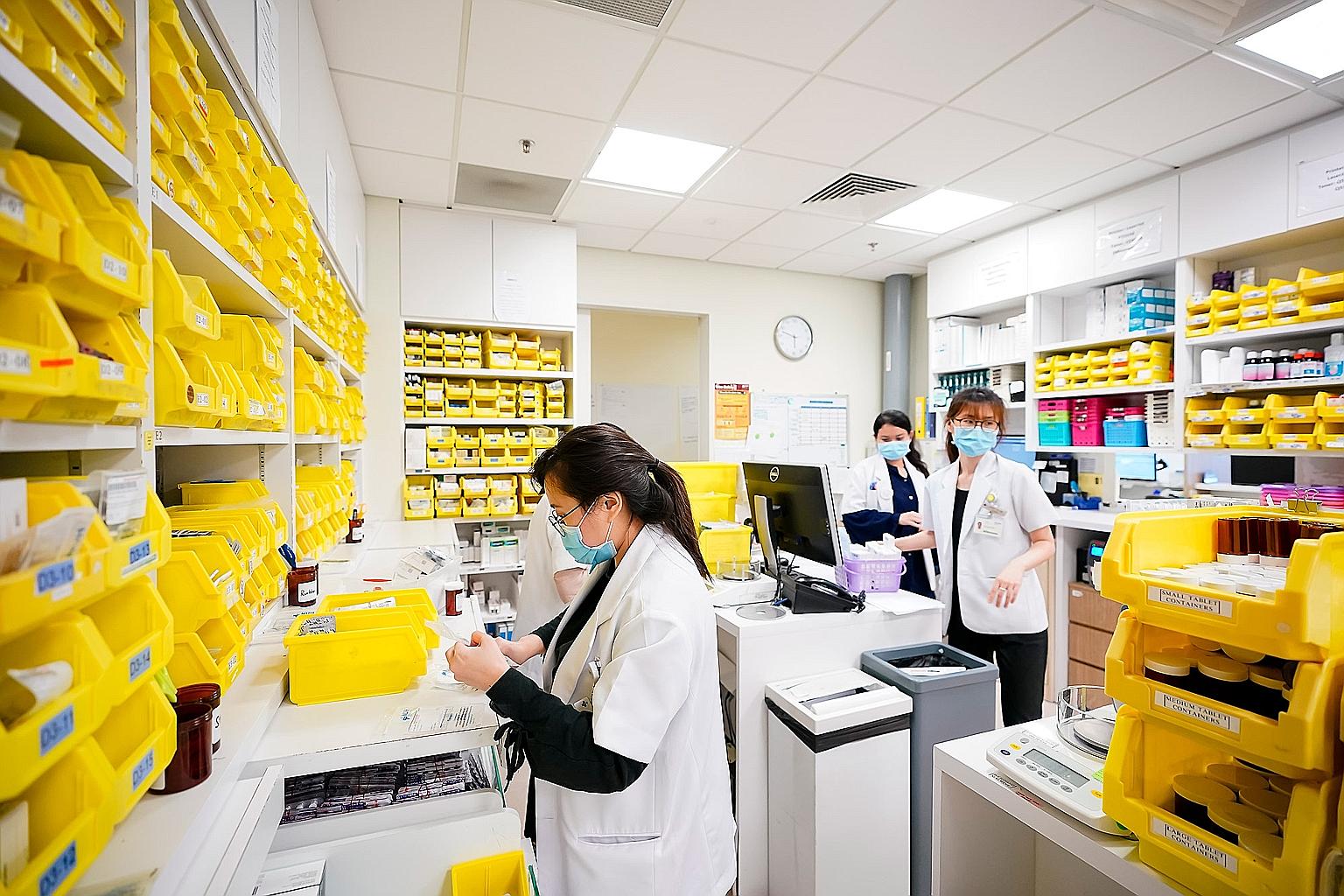Coronavirus: Hospitals in Singapore may resume elective procedures in gradual manner
MOH studying resumption of such treatments, which were put on hold to free up capacity for Covid-19 patients
Sign up now: Get ST's newsletters delivered to your inbox

Doctors performing heart bypass surgery at a hospital here last week. Since the circuit breaker period started on April 7, only essential healthcare services have been allowed to continue.
PHOTO: ST READER
Many elective procedures in hospitals have been put on hold since February to free up capacity for Covid-19 patients as the pandemic rages on. It is the same scenario in many parts of the world.
As Singapore prepares for life after the circuit breaker and some countries have started to resume elective, or non-urgent, surgery, it looks increasingly likely that some postponed elective procedures here can resume soon, though in a gradual manner.
A check with the Ministry of Health (MOH) showed that routine health screenings such as those to detect cardiovascular risk factors would be deferred until after the circuit breaker, which ends on June 1.
"We will continue to study the gradual resumption of services in a calibrated manner," said an MOH spokesman.
The spokesman said public hospitals had been deferring non-urgent and non-essential healthcare services progressively since February to ensure there would be enough capacity to treat Covid-19 patients who need hospitalisation.
Elective surgery that has been put on hold includes aesthetic services, elective eye procedures such as cataract surgery for stable cataracts, joint replacement surgery, and those for asymptomatic haemorrhoids.
Community nursing services are also on hold.
Essential care such as treatments and surgery for cancer and cardiac conditions, emergency medical and psychiatric conditions, and certain allied health services like radiography are allowed to go on.
Some elective orthopaedic procedures are understood to have been rescheduled from next month onwards.
It will likely take several months to clear the backlog, as the number of elective operations allowed will be limited to ensure that the capacity for Covid-19 patients remains.
This means patients looking to get elective surgery, like a knee replacement, done will likely have to wait longer, for a few months for an appointment when in the past, the wait could have been four to six weeks on average.
Since the circuit breaker period started on April 7, only essential healthcare services have been allowed to continue.
MOH defines these as "services which, if not provided or performed, would result in significant or rapid deterioration of the patient's medical condition, and would potentially threaten their health and well-being".
Patients whose medical conditions were assessed by a doctor to be stable or whose treatment was deemed non-essential would have their appointments deferred, the MOH spokesman said.
"For these patients, where clinically appropriate, doctors in charge may offer alternative means of consultation and treatment, such as tele-consultations and/or remote prescription and delivery of medications," he said.
Professor Chng Wee Joo, director of the National University Cancer Institute, Singapore (NCIS), said non-essential appointments, such as those for routine health screenings, have been postponed till between June and September.
At NCIS, patients on long-term follow-up, remission or maintenance cancer treatments have had the frequency of their appointments reviewed, and home delivery and telemedicine arranged.
The idea of "remote" medicine has been around for a while.

The pharmacy at the National University Cancer Institute, Singapore. The institute saw 67 telemedicine cases last month, up from 26 in March. If medications are needed, they can be sent to the patients' homes.
PHOTO: NATIONAL UNIVERSITY CANCER INSTITUTE, SINGAPORE
Before Covid-19, NCIS had run a smaller-scale pilot telemedicine scheme for more than a year, said Prof Chng. It could thus quickly scale up to do this on a bigger scale.
What the pandemic did was to hasten the acceptance of this mode of consultation, he added. NCIS had 67 telemedicine cases last month, up from 26 in March. Before that, it conducted 13 telemedicine cases on average each month.
If medications are needed, they can be sent to the patients' homes to save them a trip to the hospital pharmacy. NCIS makes about 300 deliveries a month now, compared with only 12 trips a month during pre-Covid-19 times, said Prof Chng.
"If you have a lump in your breast that you found in your self-exam, we will see you. If we find that it is worrisome, we will operate on you, so that has not changed," he said.
But if you want to screen for one, you will have to wait till more healthcare workers, who have been deployed elsewhere to help fight Covid-19, resume their usual work.
Dr Wong Seng Weng, medical director of The Cancer Centre, said a few of his patients have had their cataract surgery and knee replacement procedures postponed, but the treatment of local patients diagnosed with cancer is not affected as the odds of having an adverse health outcome from the delay of cancer treatment are generally higher than the risks related to Covid-19.
He added that the resumption of elective surgical procedures is very much dependent on inpatient bed availability, which in turn, is dependent on the evolution of the pandemic. The issues include the risk of cross infections at the hospitals and limited inpatient beds.
At the Institute of Mental Health (IMH), doctors started conducting tele-consultations (telephone or video calls) in lieu of face-to-face visits last month, as they continue to see those who are unwell or have less stable conditions.
"We trialled tele-consultations with a few patients in early April and the response has been encouraging," said Professor Lee Cheng, a senior consultant and the vice-chairman (clinical) of the medical board at IMH.
Patients with stabilised conditions have had their appointments rescheduled and their medications delivered to their homes as much as possible. They are also given a helpline number to call.


